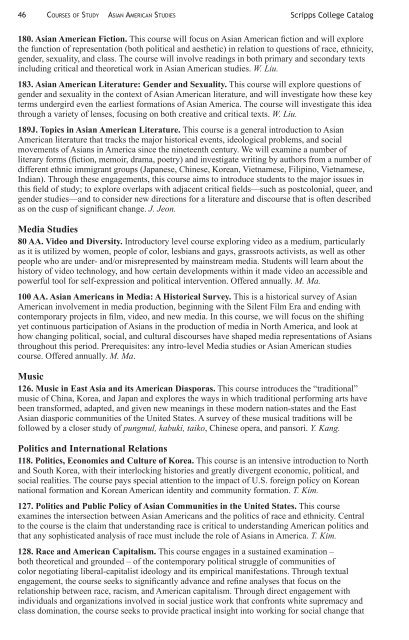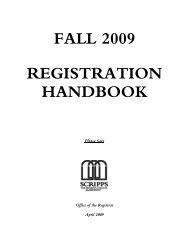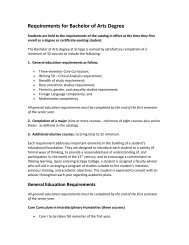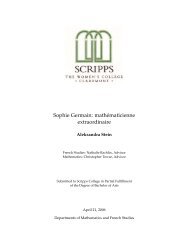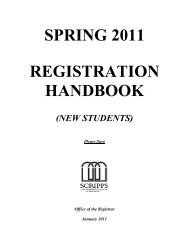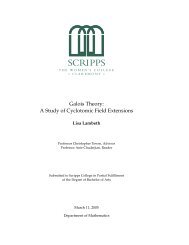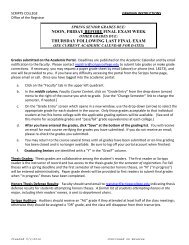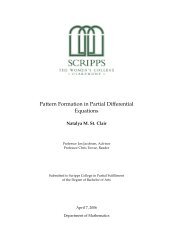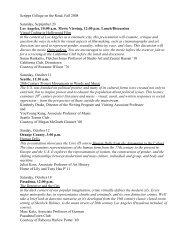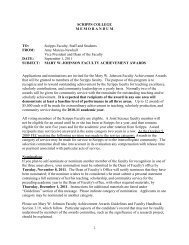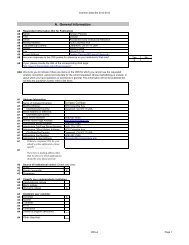PDF of the 2012-2013 Academic Catalog - Scripps College
PDF of the 2012-2013 Academic Catalog - Scripps College
PDF of the 2012-2013 Academic Catalog - Scripps College
Create successful ePaper yourself
Turn your PDF publications into a flip-book with our unique Google optimized e-Paper software.
46 Courses <strong>of</strong> Study Asian American Studies <strong>Scripps</strong> <strong>College</strong> <strong>Catalog</strong><br />
180. Asian American Fiction. This course will focus on Asian American fiction and will explore<br />
<strong>the</strong> function <strong>of</strong> representation (both political and aes<strong>the</strong>tic) in relation to questions <strong>of</strong> race, ethnicity,<br />
gender, sexuality, and class. The course will involve readings in both primary and secondary texts<br />
including critical and <strong>the</strong>oretical work in Asian American studies. W. Liu.<br />
183. Asian American Literature: Gender and Sexuality. This course will explore questions <strong>of</strong><br />
gender and sexuality in <strong>the</strong> context <strong>of</strong> Asian American literature, and will investigate how <strong>the</strong>se key<br />
terms undergird even <strong>the</strong> earliest formations <strong>of</strong> Asian America. The course will investigate this idea<br />
through a variety <strong>of</strong> lenses, focusing on both creative and critical texts. W. Liu.<br />
189J. Topics in Asian American Literature. This course is a general introduction to Asian<br />
American literature that tracks <strong>the</strong> major historical events, ideological problems, and social<br />
movements <strong>of</strong> Asians in America since <strong>the</strong> nineteenth century. We will examine a number <strong>of</strong><br />
literary forms (fiction, memoir, drama, poetry) and investigate writing by authors from a number <strong>of</strong><br />
different ethnic immigrant groups (Japanese, Chinese, Korean, Vietnamese, Filipino, Vietnamese,<br />
Indian). Through <strong>the</strong>se engagements, this course aims to introduce students to <strong>the</strong> major issues in<br />
this field <strong>of</strong> study; to explore overlaps with adjacent critical fields—such as postcolonial, queer, and<br />
gender studies—and to consider new directions for a literature and discourse that is <strong>of</strong>ten described<br />
as on <strong>the</strong> cusp <strong>of</strong> significant change. J. Jeon.<br />
Media Studies<br />
80 AA. Video and Diversity. Introductory level course exploring video as a medium, particularly<br />
as it is utilized by women, people <strong>of</strong> color, lesbians and gays, grassroots activists, as well as o<strong>the</strong>r<br />
people who are under- and/or misrepresented by mainstream media. Students will learn about <strong>the</strong><br />
history <strong>of</strong> video technology, and how certain developments within it made video an accessible and<br />
powerful tool for self-expression and political intervention. Offered annually. M. Ma.<br />
100 AA. Asian Americans in Media: A Historical Survey. This is a historical survey <strong>of</strong> Asian<br />
American involvement in media production, beginning with <strong>the</strong> Silent Film Era and ending with<br />
contemporary projects in film, video, and new media. In this course, we will focus on <strong>the</strong> shifting<br />
yet continuous participation <strong>of</strong> Asians in <strong>the</strong> production <strong>of</strong> media in North America, and look at<br />
how changing political, social, and cultural discourses have shaped media representations <strong>of</strong> Asians<br />
throughout this period. Prerequisites: any intro-level Media studies or Asian American studies<br />
course. Offered annually. M. Ma.<br />
Music<br />
126. Music in East Asia and its American Diasporas. This course introduces <strong>the</strong> “traditional”<br />
music <strong>of</strong> China, Korea, and Japan and explores <strong>the</strong> ways in which traditional performing arts have<br />
been transformed, adapted, and given new meanings in <strong>the</strong>se modern nation-states and <strong>the</strong> East<br />
Asian diasporic communities <strong>of</strong> <strong>the</strong> United States. A survey <strong>of</strong> <strong>the</strong>se musical traditions will be<br />
followed by a closer study <strong>of</strong> pungmul, kabuki, taiko, Chinese opera, and pansori. Y. Kang.<br />
Politics and International Relations<br />
118. Politics, Economics and Culture <strong>of</strong> Korea. This course is an intensive introduction to North<br />
and South Korea, with <strong>the</strong>ir interlocking histories and greatly divergent economic, political, and<br />
social realities. The course pays special attention to <strong>the</strong> impact <strong>of</strong> U.S. foreign policy on Korean<br />
national formation and Korean American identity and community formation. T. Kim.<br />
127. Politics and Public Policy <strong>of</strong> Asian Communities in <strong>the</strong> United States. This course<br />
examines <strong>the</strong> intersection between Asian Americans and <strong>the</strong> politics <strong>of</strong> race and ethnicity. Central<br />
to <strong>the</strong> course is <strong>the</strong> claim that understanding race is critical to understanding American politics and<br />
that any sophisticated analysis <strong>of</strong> race must include <strong>the</strong> role <strong>of</strong> Asians in America. T. Kim.<br />
128. Race and American Capitalism. This course engages in a sustained examination –<br />
both <strong>the</strong>oretical and grounded – <strong>of</strong> <strong>the</strong> contemporary political struggle <strong>of</strong> communities <strong>of</strong><br />
color negotiating liberal-capitalist ideology and its empirical manifestations. Through textual<br />
engagement, <strong>the</strong> course seeks to significantly advance and refine analyses that focus on <strong>the</strong><br />
relationship between race, racism, and American capitalism. Through direct engagement with<br />
individuals and organizations involved in social justice work that confronts white supremacy and<br />
class domination, <strong>the</strong> course seeks to provide practical insight into working for social change that


